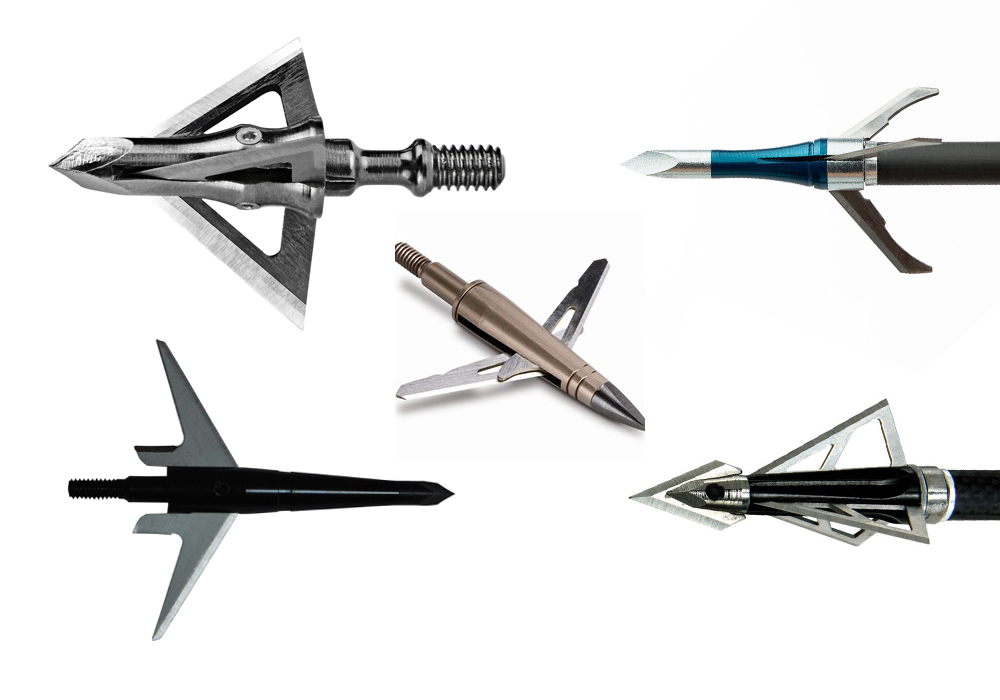For archers there are hundreds of broad-heads on the market and one would assume that they are all decent at their job of making a bigger hole. However, a big hole isn’t the only criteria for a broad-head. At least if you want the most effective broad-head for your chosen game.
Sometimes a big hole is the most effective, sometimes you need more penetration. Smaller animals are more effectively killed with shock. Selecting a broad-head that is more appropriate for your chosen game is just smart and can save you on damaged or broken arrows.


Remember, as hunters, our goal is not only to score a kill but to score an ethical kill. All of the selections below are based on my own personal experience. I am sure many hunters have had success with broad-heads that I would not consider appropriate for the particular game.
Though this article is really aimed at compound bow hunters, you can find plenty of information on crossbow broad-heads here.
Small Game


If your goal is to take smaller game like squirrel or rabbit, there are specifically designed broad-heads that are quite effective at providing the shock you need without over penetration. The last thing you want is to bury your expensive broad-heads in dirt or wood and risk breaking them.


Small game heads may have a blunt tip with wire tines, a claw-like appearance, or even just a blunt point. You don’t need penetration for small game, just to cause enough shock and blunt force damage to stop them. These blunt broad-heads are made to take a beating without breaking.
Of course, for most small game, you can use a field point if you choose. They don’t kill as quickly in most cases but they are effective. It also makes losing arrows easier as they pass through the animal. Make sure you have a good backstop.
Small Bird


It takes a special kind of hunter to take a bird with a bow. We aren’t talking about turkey but the smaller bird species. Animals like grouse, duck, partridge, dove, and even quail fall into the small bird category. They are the most challenging hunt with a bow that you can ever experience.
To take a small bird, the secret is to increase the size of your arrow tip. Native Americans used crossed sticks, sometimes with bark woven around them into a basket shape. The extra size of the arrow tip was enough to cause appropriate trauma to the animal and get a clean kill.


Modern birding arrows have a semi-blunt tip with wire loops that provide the shock and killing blow. This ensures that the bird can’t fly away and die in some unknown location.
I have seen people use field points for small birds as well. The same problems you have with small game are far more likely with birds including a lack of shock to keep the bird from flying away and getting lost.
Turkey


Turkey are tricky and often one of the most challenging animals to take down quickly with a bow. Because of their physiology, its possible to kill a turkey, even decapitate it and have it run for some distance. If you fail to cause enough damage, the bird may be hundreds of yards away and lost before it goes down.
In the past, some hunters would put large steel washers behind their broad-heads to knock the bird down so it died in place. Arrows fired this way lacked in accuracy but were effective. Now that technology has caught up, mechanical broad-heads do much the same thing.


The key to turkey is a huge wound and enough shock to keep it from running. A mechanical broad-head that has a huge cutting diameter is the best bet. A turkey’s body is easy to penetrate so depth won’t be an issue, you just have to cause enough trauma that the bird doesn’t go tearing through the woods with your arrow through him.
Deer (White Tail, Black Tail, & Mule)


The most common animals hunted with a bow, deer are actually quite forgiving on broad-head selection. There are a variety of mechanical broad-heads that work well and most any fixed blade will do fine. All you really need to take down a deer is enough penetration to get through his heart or lungs.
Mechanical broad-heads are the current trend with everyone looking for the largest cutting diameter broad-head available. I would actually go against this. Mechanical is fine but you don’t need a 2-inch cutting diameter. Blades that size can too easily get hung up in bone and never hit the organs that really make a difference.


I use a one-piece solid broad-head with fixed blades. I have seen them splinter bone and go completely through a 150-pound white tale. The damage is sufficient for blood loss and the penetration is so much better. They have been used for over a generation with great success.
Elk, Hog, Bear, and other Large Game


Penetration is the real killer and animals with heavy bones are great at binding up arrows and not letting them get deep enough to do their job. I have seen many hogs shrug off hits with broad-heads that would have dropped a deer in their tracks. Forget the mechanical broadheads for elk and their large diameters. For large, heavy-boned animals you want deep penetration.


I only recommend a heavy, sharp, fixed blade broad-head for these animals. Preferably something with either a chisel tip or some other strong tip geometry. Yes, I am aware that all of these animals have been taken with mechanical broadheads for elk but they have been missed with mechanical broad-heads as well. This article is about increasing the odds.
Go with what you want but I will take a strong, heavy fixed blade every time with the confidence that it will do its job.


